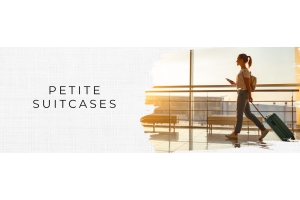10% Off Your First Order*
Est. 1923 – 100 Years Selling the World’s Finest Luggage
Call an expert: 0345 0038283

What can I take on a plane? Liquids to foods
Packing for a holiday can be stressful, but fear not! We have a comprehensive guide that will help to get you jetting off on your holidays without the stress of worrying about what you can and cannot take on the plane.
We know there are awesome all too common questions about what is allowed on a plane, in your hold luggage and in the cabin luggage.
We’ve answered some of the most common questions, so you know exactly what you can take on board, including medications, electronics, liquids and baby food. We’ll also explore some niche situations, such as travelling with pets.
What can I take on a plane?
Rules about what you can take on a plane are fairly standard, but what you can take to different destinations might differ. This is why it’s vital to check before you travel. The airline’s restrictions are not the only ones to consider, you also need to think about the customs checks in the country you are travelling to.
What liquids are allowed on a plane?
Since 9/11, we have had different rules about taking certain items on planes, including liquids. There are now limits to the volume of liquids you can take on the plane in your cabin luggage. There are no limits on checked luggage, so you can always put liquids in your hold luggage if in doubt.
The official restrictions on what you can take on a plane can be found on this government guide. There are special rules for things like baby milk and food, those with special diets and items that are purchased once you have passed through security. Medication also has separate rules.
Liquids are limited to 100ml
The most important rule to remember is that your liquid containers cannot hold over 100ml. It doesn’t matter if the container is half full, it cannot be bigger than a 100ml container. Anything larger than this should be placed in your hold luggage.
Remember that liquids is a broad term that includes a wide range of items, including:
- Drinks
- Certain foods, such as soup, baby food and honey
- Makeup and toiletries
- Sprays and aerosols
- Gels
- Contact lens solution
Remember that the 100ml limit applies to the container they are stored in, not the actual volume of the liquid. In addition to this, all of your liquids need to fit inside a clear plastic bag. The bag should be no larger than 20cm by 20cm. These are often available at the airport if you don’t have your own.
Each person is entitled to carry one plastic bag of liquids. It’s a good idea to check that your liquids fit inside the bag before you travel to the airport to make sure you don’t have to leave any items behind at security. You also need to be able to seal the bag, so don’t
If you smoke and use a lighter, you should take this in your cabin luggage and put it in a clear plastic bag with your other liquids. Lighters are not allowed in the hold luggage.
Once you have passed through security, you will be able to purchase items that are larger than 100ml, including duty free perfume and spirits. You’ll be able to take this on your flight, provided it remains sealed in the bag.
Remember that if you are only travelling with hand luggage and you buy something like perfume at the airport, you won’t be able to bring this home with you if it is larger than 100ml. You should purchase this on your return journey if you don’t have any hold luggage.
Exceptions to the liquid rule
There are a few exceptions to the liquid rule, and this includes baby food and formula. There is no limit on how much baby food and formula you can take through security, but you may be limited to the size of your bag.
There are other exceptions, including medicine, but you may need to show your prescription and demonstrate why you need more than 100ml of the item. This can often be achieved by showing the prescription with your dosage.
Travelling with medicines
Before deciding if you will put your medicine in your hand luggage or hold luggage, you first need to confirm that it is permitted in the country you are travelling to. You may need to travel with a doctor’s note to confirm why you need the medicine. You may also need to limit how much you travel with.
For prescription medications, you can contact the embassy of the country you are travelling to and confirm what you need to bring with you to be able to travel with your prescription medication.
There may be severe penalties for trying to bring certain prescription and over the counter medications into other countries. Even if they are common in the UK, don’t assume this is the same everywhere. The same applies to some herbal remedies such as CBD oil.
Speak to your doctor before you travel
Your doctor can tell you how much medicine you need to take with you on your trip and where to store it. You might take a small amount with you in your hand luggage and keep the rest in your hold luggage. However, if your medication is essential, you should keep this in your cabin luggage. This is because of the risk that your luggage could go missing on the flight, which would leave you overseas without access to your essential medication.
If you have any medical equipment you need, airport security may need to check that it is safe for travel. Your doctor can provide you with a note that explains why you need the equipment and how it is used.
Keep this note with you for your return journey as you may need to go through the same checks again.
Travelling with medication
If you choose to keep all of your medication in your cabin luggage, then you may need to explain this to airport security. This is particularly true if you have medicine over 100ml or if you require sharps.
Whether you’re travelling with a large number of pills or liquid medicine, you need to make sure it is housed in its original packaging and that you have clear instructions from your doctor. This should include information about your dosage, so it will be easy to see why you need to take so much medicine for the duration of your stay.
You might also decide to travel with a backup supply of medicine in your hold luggage. This will help to avoid any problems if you misplace your luggage while you are away or if your return trip is delayed for any reason.
Provided you have a doctor’s note for all equipment, medicine and sharps, you should have no trouble passing through airport security. Just be prepared by arriving at the airport early so you have time to get through security.
Ask for assistance
If you need additional support at the airport, don’t be afraid to ask for assistance. This kind of support is not reserved only for the elderly or disabled. There are many situations where you might need extra support.
For example, if you have recently had surgery, you might struggle to stand for long periods. You could ask the airline for help getting on the plane, or they might be able to offer a seat upgrade to make you more comfortable.
Check if you’re using a controlled medication
Some medicines are only legal in specific contexts. This includes steroids and painkillers containing opiates, such as codeine. To be able to travel with this type of medication, you will need a personal licence, which you can obtain from the Home Office.
It can take around 10 days to secure this licence, so make sure you apply well in advance to avoid any delays. You may also need a note from your doctor to accompany your licence. Getting everything ready well in advance of your trip will save lots of stress.
Make sure you have adequate travel insurance
Travel insurance is an essential part of any trip abroad. It will cover you for unexpected medical costs, lost or stolen items, and cancellations/delays to your flight or other transport arrangements.
Make sure you have adequate cover before departing, as it could save you from expensive bills later on down the line. Research different policies and compare prices before settling on one policy that suits your needs and budget.
If you need to travel with lots of medications, you should make sure that your travel insurance is comprehensive. This will ensure you can visit a doctor or the hospital if you need to while you are overseas. Remember that we don’t have the same relationship with the EU anymore, so you won’t be entitled to free care.Read the policy before you purchase, as it might not include the level of cover that you need.
What electronics can I take on the plane?
A while ago, there was a time when taking gadgets such as laptops and tablets on planes was problematic, but those days are largely behind us now. You can now travel with electronics in your hold luggage or your cabin luggage. You'll need to be prepared to take them out for screening during security, but you can easily pack your bag in a way that makes them accessible.
At security, you may also be asked to turn on any devices you are carrying. This is a security measure to make sure that they are in working order and not used for some other purpose.
If you're unsure about what electronics you can take on board, then it's best to check with your airline before travelling. Different airlines can have different rules, so don't assume that all airlines will have the same regulations.
In general, the following electronic devices will be fine to travel with:
- Phone
- Laptop
- Chargers
- Portable power packs
- Plug adapters
- Tablet
- Digital Camera
- E-reader
- Game consoles
- Portable DVD players
- Electric toothbrush
- Noise cancelling headphones
- Hair dryers, straighteners and curling wands
- Beard trimmer
It's best to check the airline website for any specific rules about taking electronics on board. Some airlines may not allow certain items due to their size or weight, and others may have restrictions on batteries and other power sources.
Can I travel with my pet?
If you want to take your canine or feline friend away with you, you'll need to confirm this with the airline. Different airlines have different rules, so you should check with them before making your booking.
Generally speaking, the airline will require that your pet is vaccinated and microchipped. They may also want to see a valid health certificate from your vet, as well as proof of age for puppies and kittens. Some airlines may even require an animal passport or a letter from your vet.
Many airlines have relaxed rules about pets in the cabin, and this isn't only extended to assistance animals like guide dogs. It's best to check with the airline in advance, as some may have restrictions on where pets can travel (e.g. in the cargo hold or the cabin).
If your pet is travelling in the hold, there is a chance the drop off point will be different than if they were travelling in the cabin. You might need to drop off your pet at a cargo depot rather than the usual check in desk. You should also give yourself plenty of time to travel on to the passenger terminal so you don’t miss your flight.
If you’re taking your pet abroad, you should also be aware of any entry requirements for their destination country. If you’re travelling within Europe, then you might need to get an animal health certificate from your vet.
This has replaced pet passports. Some countries may also require that your pet is vaccinated against certain diseases, so it's important to check the regulations for your destination before booking.
You should also check if your pet insurance covers overseas travel. Some policies only cover care in the UK, so you won’t be covered while travelling. Securing travel insurance for your pet will help you to take care of your pet if something goes wrong overseas.
Finally, don't forget to pack all the essentials for your pet such as food, toys and bedding. And remember that pets can be affected by changes in temperature, so make sure their crate offers good airflow.
It's best to plan ahead and be prepared for any eventuality when travelling with a pet. That way, you can ensure that your furry friend has a safe and stress-free journey.
International rules for travelling with cats and dogs
Pet passports are no longer valid for the EU and Northern Ireland, so you will need to obtain a valid animal health certificate (AHC) from your vet. This can take a few days to process, so make sure you make arrangements well in advance. Your pet will also need to be microchipped and be up to date with all vaccinations, including rabies.
If you are taking your pet outside of the EU, check with the embassy of the country you are visiting to learn more about their rules and restrictions. Your pet may need to be quarantined on arrival, which could make shorter trips not worthwhile.
Luggage allowances on flights
Airlines are very strict about weight limits and the size of your luggage. While a few additional kilograms might not seem like much, if every passenger on board has overweight luggage, this will lead to the plane being heavier and it will require more fuel for the journey.
To discourage you from taking too much luggage, airlines have strict rules and you will need to pay for any oversized luggage.
For hand luggage, the rules are very specific and strict because there is limited room in the cabin. There might not be enough space to store all bags if every passenger carries a large suitcase on board.
Every airline has different rules for their luggage, so it’s important to check before you travel. Different ticket types can also have different luggage allowances, so check your booking confirmation for more details.
Rules on hold luggage
Almost everything can be carried in the hold, including suitcases, bikes, musical instruments, pets and even coffins. Most passengers will be entitled to one hold bag and will have to pay extra for specialist items like bikes or other sporting equipment.
There may be weight limits on your hold luggage and this will be weighed at check in. If you don’t want to be stung by additional baggage charges, make sure you check the weight of your bag before you get to the airport.
If you have any valuables in the hold, make sure that it is covered by your travel insurance. If it isn’t, you should keep it with you in the main cabin so your insurance policy remains valid.





